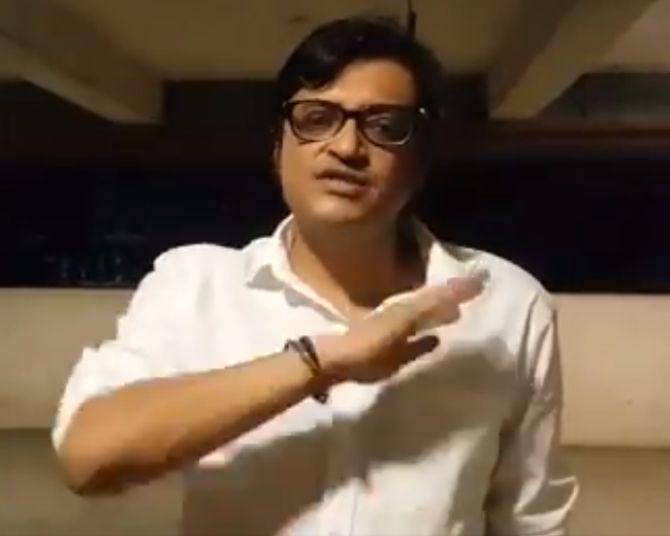Arnab Goswami Chats & The Commodification Of Patriotism

These are interesting times as ‘desh bhakti’ goes. Arnab Goswami, the most patriotic among our patriotic television anchors, is in a bit of a mess. His indiscreet WhatsApp chats with a suspected high-profile accomplice in the TRP scam are out in the public domain and it is apparent that love for the country was not the sole motive driving his brand of journalism. Since we still don’t have a convincing denial on the genuineness of the chats from the man himself we have to assume them to be true for the time being. The fact that high-profile spokespersons from the ruling ecosystem have not jumped to his defence with the usual reflexive alacrity could be a pointer to the veracity of the leaked conversation.
Assuming the content of the chats was not plain bluff and bluster typical of a streetsmart journalist, there are a few interesting takeaways from those. Analyses in the media reveal the following: One, rigging of ratings by his television channel, which amounts to duping advertisers; two, unfair play against competitors who may have bigger viewership but end up with less revenue; three, peddling influence with functionaries of the government to favour someone – remember Barkha Dutt and the Niira Radia tapes?; and four, leaking of official secrets. The whole affair surely stinks of corruption, illicit collusion and brazen violation of media ethics. Not expected from someone given to high decibel, no-holds-barred hectoring on such matters, particularly when it involves ideological enemies, on primetime shows.
Before you utter ‘hypocrite’ or ‘double standard’, here’s a sober reminder: most of those trying to pillory him with those charges, particularly rivals in the television space, don’t exactly come out smelling of roses when judged on those counts. Like in all profit-driven businesses, the media business too has its fair share of crooks, corruption, ethics-bending habits and disdain for professionalism. Perhaps it has more of all these because of access to power, capacity to manipulate public opinion and the scope to get away with lies and falsehood. Insiders would grasp it with much more clarity than those outside awestruck by the cultivated faux aura of some big media personalities and organisations. The noise, let’s be assured, is primarily about loss of revenue, not so much about moral standards or restraint in journalism.
That dimension placed in perspective, let’s dwell on ‘desh bhakti’, the hottest selling proposition on Indian television for some years now. The apparent glee in these WhatsApp chats at high viewership after the death of 41 security personnel at Pulawama in a terror attack points at serious flaws, if not deep contempt for people, inherent in television patriotism. If the families of the victims of the attack are feeling deceived and used at this point, it is good reason to take a look at the commodification of patriotism by the media.
A distinct brand of journalism, marked by restraint-free jingoism, hyperventilation on nationalistic sentiments and discovery of new anti-nationals at every bend, has taken shape ever since smart media players realised patriotism could be a great money-spinner. The trend took off after the ascendance of the BJP under Prime Minister Narendra Modi and of the ideological Right in general, when the country witnessed efforts to spread positivity about India and make nationalism a factor fostering bonding among people in a diverse country. For some in the media it was an opportunity to be cashed, literally as well as figuratively. People emotional about their country was a good market to be captured.
That patriotism would soon get transformed into a commodity for mass consumption, and even entertainment, just as cricket or cinema, was in the logic of these developments. Since it was a commodity, it had to be packaged appealingly to grab eyeballs and buyers. On television, packaging took place in the form of long emotional rants from anchors, verbal acrobatics from reporters on the ground, panel discussions manipulated to highlight a single view point, elimination of rational opinions, selective visuals to heighten the sense of drama and, of course, identifying enemies to channel public anger generated through these efforts. Higher viewership was vindication of the success of the stretegy. It meant revenue. No wonder the competition to sell patriotism has been intense.
The Arnab school of journalism – he can safely be called the pioneer of this school – has only got bigger with clones and the me-too crowd in the media. With TRP playing God in their world, the creepy feeling here is that the more the competition the more crass patriotism on the media is likely to become. Media managers would secretly celebrate killing of jawans, and even always stay in anticipation of their death, to reap rating points while adopting a contrasting public posture. Desh bhakti of the media would actually turn into shameless self-bhakti.
To end this article, two rhetorical questions: Should this shameless manipulation of the innocent love of the masses for their country continue? Should patriotism be a market commodity?

Comments are closed.